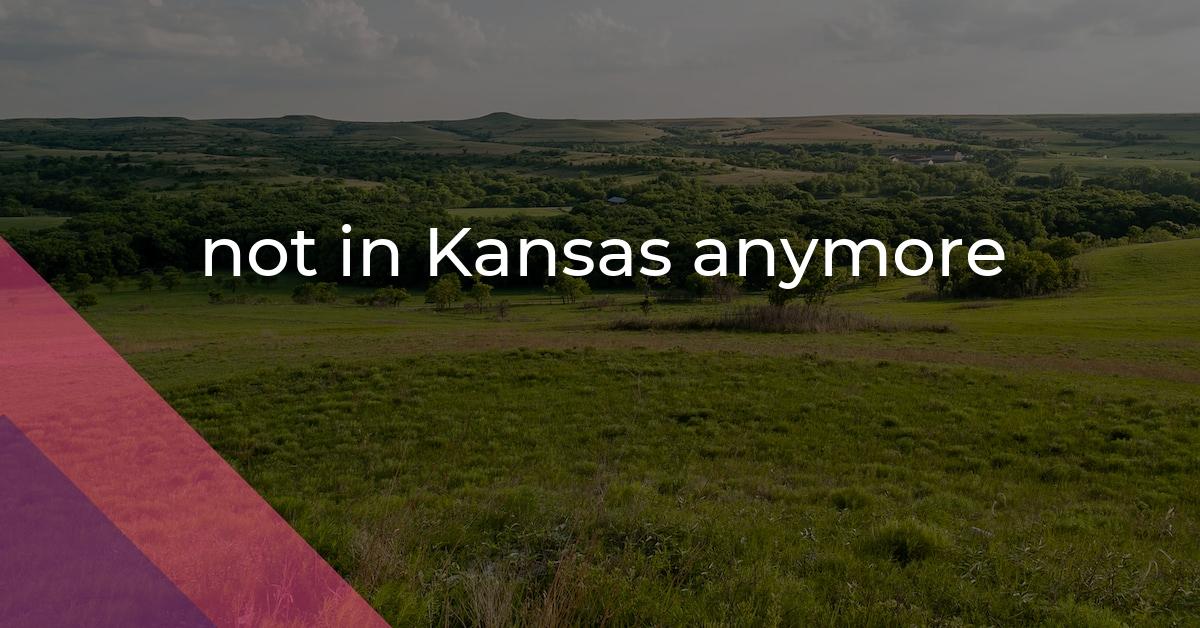not in Kansas anymore: Idiom Meaning and Origin
What does ‘not in Kansas anymore’ mean?
The idiom "not in Kansas anymore" is used to convey a feeling of being in a completely unfamiliar or strange situation, often implying a sense of being overwhelmed or out of one's element.

Idiom Explorer
The idiom "unused to" is used to describe a situation where someone is not accustomed to or familiar with something. It implies a lack of experience or familiarity in a particular context or activity.
The idiom "out of place" means something or someone not in the correct or suitable position, situation, or context.
The idiom "out of one's mind" means to be mentally deranged or insane.
The idiom "out of one's element" means to be in a situation or place where one feels uncomfortable or is not able to perform as well as usual.
When someone is "out of their depth," it means they are in a situation that is too difficult or complex for them to handle or understand.
The idiom "out of one's box" means to be acting in an unconventional or unexpected way, deviating from one's usual behavior or habits.
The idiom "out of nowhere" means something unexpectedly or suddenly appearing without any prior indication or warning.
The idiom "out of kilter" means something is not working or functioning correctly, being out of balance or alignment.
The idiom "out of house and home" means to be completely destitute, having lost everything one possesses, especially due to financial hardships or being forced to leave one's home.
The idiom "out of frame" means that something or someone is not included or considered in a particular situation or context. It suggests that the subject is not within the scope or boundaries of what is being discussed or depicted.
Decoding Dorothy's Dilemma
The idiom "not in Kansas anymore" is often used as a metaphor to describe a significant shift or change in one's surroundings. It evokes the feeling of being out of one's element, like a fish out of water. It is a way to express a sense of being out of place or out of one's comfort zone. The idiom suggests that the person is no longer in familiar territory and must adapt to new circumstances, feeling as if they are out of nowhere. They are unused to the new environment and must find their footing.
The origins of the idiom can be traced back to the 1939 film "The Wizard of Oz." In the film, the main character Dorothy, after being swept away by a tornado, finds herself in the magical land of Oz. She utters the iconic line, "Toto, I've a feeling we're not in Kansas anymore." This line has since become synonymous with the feeling of being in an unfamiliar or unfamiliar situation. It conveys a sense of danger or uncertainty, highlighting the challenges of navigating an unfamiliar world.
The idiom "not in Kansas anymore" has become deeply ingrained in popular culture and is frequently referenced in music, literature, and everyday conversation. It is often used humorously or poetically, invoking a sense of nostalgia for the past. The idiom also highlights the challenges of adapting to a new environment and the inherent discomfort that comes with it.
Interestingly, the idiom "not in Kansas anymore" has also gained a political connotation in recent years. It is sometimes used to describe a shift in political climate or policy that deviates from the norm or expected. This usage draws on the idiom's association with change and the sense of disorientation it implies. It implies that the political landscape has shifted dramatically, leaving people feeling out of place and unsure of their surroundings.
The idiom "not in Kansas anymore" captures the feeling of being out of one's element perfectly. It conveys a sense of being out of place and out of one's comfort zone. It is a reminder that the world is constantly changing, and we must adapt to new circumstances. Whether it's traveling to a new country, starting a new job, or experiencing a major life event, the idiom reminds us that we are capable of overcoming challenges and finding our way in unfamiliar territory.
Overall, the idiom "not in Kansas anymore" is a powerful expression that embodies the feeling of being in an unfamiliar or unfamiliar situation. It speaks to the challenges of navigating a world that is constantly evolving and reminds us of our ability to adapt and thrive in new circumstances. So, the next time you find yourself in a situation that feels foreign and uneasy, remember that you're not in Kansas anymore, but you have the tools to navigate the unknown.
Example usage
Examples:
- I felt like Dorothy from The Wizard of Oz when I moved to the big city - I was definitely not in Kansas anymore.
- After traveling abroad for a year, I returned home and realized that things had changed so much - I was not in Kansas anymore.
- When I started my new job, I quickly realized that the work environment was completely different from what I was used to - I knew I wasn't in Kansas anymore.
Analysis:
The idiom "not in Kansas anymore" is often used to indicate that someone is in an unfamiliar or completely different situation than what they are used to. It originates from the famous line spoken by Dorothy in The Wizard of Oz when she realizes she is no longer in her familiar home state of Kansas. The idiom is typically used when experiencing a significant change in environment or circumstances.
In the examples provided, the first sentence suggests that the person has moved from a small town to a bustling city, creating a new and unfamiliar experience. The second sentence indicates that someone has returned home after an extended period of time and notices significant changes, implying a sense of disorientation. The third sentence portrays someone starting a new job and realizing that the work environment is very different from what they anticipated, highlighting a sense of unfamiliarity.
More "Location" idioms



